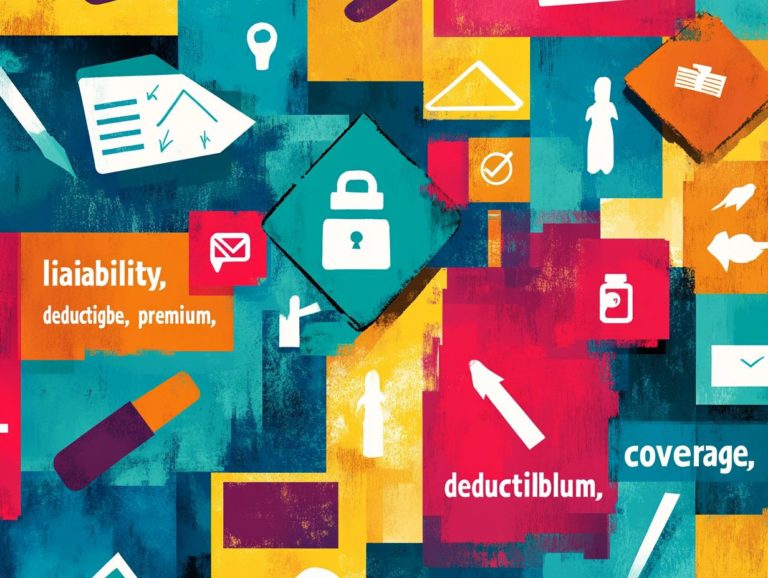5 Affordable Insurance Tips for Freelancers
Navigating the world of insurance can feel overwhelming, especially for freelancers who balance various roles without the safety net typically provided by traditional employers. This article presents five essential tips designed to empower you in evaluating your insurance needs, researching providers, and discovering cost-effective solutions tailored specifically to your unique situation.
From grasping the different types of coverage you may require to uncovering potential discounts and steering clear of common pitfalls, this guide will help you feel confident and prepared to ensure you’re well-protected while optimizing your budget.
Contents
- Key Takeaways:
- 1. Evaluate Your Insurance Needs
- 2. Research Different Insurance Providers
- 3. Consider Bundling Your Policies
- 4. Look for Discounts or Special Programs
- 5. Review and Update Your Insurance Regularly
- What Types of Insurance Do Freelancers Typically Need?
- What Are the Benefits of Having Insurance as a Freelancer?
- What Are the Risks of Not Having Insurance as a Freelancer?
- How Can Freelancers Save Money on Insurance?
- What Are Some Common Mistakes Freelancers Make When It Comes to Insurance?
- How Can Freelancers Stay Informed about Changes in Insurance Policies?
- Frequently Asked Questions
- What are some affordable insurance options for freelancers?
- How can I save money on insurance as a freelancer?
- Do I need liability insurance as a freelancer?
- What should I consider when choosing an individual health insurance plan?
- Is disability insurance necessary for freelancers?
- Can freelancers get help with health insurance costs?
Key Takeaways:

1. Evaluate Your Insurance Needs
Evaluating your insurance needs is vital for freelancers. This ensures sound financial planning and provides essential protection against unexpected circumstances.
Areas like health coverage and retirement savings are particularly crucial, as they can significantly influence your quality of life and financial stability. Understanding the unique challenges you face such as fluctuating income streams and varying market risks is essential when determining the types of insurance that are necessary for your situation.
In this respect, health insurance brokers play an invaluable role, helping you navigate the complexities of the marketplace to find suitable coverage tailored just for you.
When assessing insurance costs, carefully consider potential tax deductions and benefits under the Affordable Care Act (ACA). This approach helps you cut costs and boost your savings while maximizing your protection.
By crafting a comprehensive insurance strategy, you can better safeguard your livelihood and pursue your ventures with confidence.
2. Research Different Insurance Providers
Researching various insurance providers is crucial for freelancers to discover the health insurance plans and coverage options that best suit your unique needs.
By meticulously comparing different plans, you gain valuable insights into premium costs and explore various levels of coverage, deductibles (the amount you pay out of pocket before insurance kicks in), and co-pays (the fee for each visit to a doctor). Leveraging the health insurance marketplace provides a streamlined approach to these comparisons.
It’s also important to understand group coverage options, which can sometimes offer enhanced benefits at more affordable rates. Organizations like the Freelancers Union can guide you through this complex landscape, ensuring you make informed decisions.
Certified tax professionals can clarify how different insurance alternatives impact your tax liabilities, ultimately steering you toward the most beneficial choices.
3. Consider Bundling Your Policies
Bundling your insurance policies can lead to substantial savings and a more comprehensive safety net, especially for freelancers in search of affordable healthcare and protection against various risks, including disability coverage.
By combining health, disability, and liability insurance into one cohesive package, you not only streamline your premium payments but also simplify the management of these crucial policies. This approach can be particularly beneficial, as it often results in lower overall costs thanks to the discounts that providers typically offer for bundled coverage.
As a self-employed individual, you may qualify for specific tax deductions on your premiums, which can further alleviate financial pressures. For new freelancers, utilizing 5 tax-savvy tips can help maximize these benefits. This strategic organization enhances your protection against unforeseen circumstances and cultivates a greater sense of security as you navigate the complexities of independent work.
4. Look for Discounts or Special Programs

Exploring available discounts and special programs can significantly lower your insurance costs as a freelancer. This makes essential health coverage more accessible while accommodating your variable income and unique situation.
Programs like financial help from the government that lowers your monthly insurance costs can ease the burden of monthly premiums. This enables you to secure necessary medical services without straining your budget. Medicaid also provides essential coverage for qualifying low-income individuals.
If you have a family, the Children s Health Insurance Program is a crucial lifeline. It ensures that your children have access to the health services they need. Consulting services can also be invaluable, guiding you through these options and helping you craft a financial plan that aligns your health coverage with your fluctuating income patterns.
This approach can transform your health and security into something more vibrant and stable.
5. Review and Update Your Insurance Regularly
Regularly reviewing and updating your insurance is essential to navigate the ever-changing landscape. This is particularly important for freelancers whose income streams and market risks can vary significantly.
This fluctuation directly influences your financial planning and health coverage needs. By engaging in this process, you ensure that the protection you have aligns with your current lifestyle and income.
It also helps you identify potential gaps that may emerge during unexpected downturns. Routine check-ins allow you to assess whether your existing health insurance remains adequate while also taking into account how you manage your money.
Given that client retention is critical for business sustainability, adapting your policies in response to evolving work conditions becomes imperative. Timely updates to your insurance can ultimately enable you to maintain financial resilience and security in the face of uncertainty.
What Types of Insurance Do Freelancers Typically Need?
Freelancers often find themselves in need of various types of insurance to protect their health, income, and financial future. You should consider health insurance, disability insurance, and retirement savings options tailored to your unique work situation and financial strategy.
In today’s world, where job security can feel like a fleeting concept, it’s crucial for independent workers like you to explore diverse insurance options that meet your specific needs. Additionally, understanding 5 tips for freelancers on tax write-offs can help you maximize your deductions and ensure your financial stability. Health insurance is essential, providing a buffer against soaring medical costs.
Likewise, disability insurance secures your income, ensuring you stay afloat in the face of unexpected illness or accidents. You should also think about retirement plans, such as IRAs or solo 401(k)s, which can help you build a stable financial future. Additionally, consider these 5 income management tips for new freelancers to enhance your financial stability.
Health savings accounts (HSAs) are another smart move, allowing you to set aside pre-tax dollars for medical expenses. By weighing these options, you can cultivate a safety net that bolsters both your current well-being and your future aspirations.
What Are the Benefits of Having Insurance as a Freelancer?
Having insurance as a freelancer offers substantial advantages that can significantly enhance your professional journey. This includes health coverage, improved financial planning, and a secure retirement.
With access to quality health coverage, you can protect your well-being against unexpected medical expenses. This allows you to concentrate on your work without the constant anxiety of potential financial strain.
This sense of security extends to your financial planning. Knowing you re covered enables you to budget and save strategically for the future, ultimately boosting your retirement prospects.
When clients observe that you re actively managing risks through insurance, it builds trust and reliability, which is essential for client retention. By showcasing your professionalism and preparedness, you enhance your reputation, making yourself a more attractive option for potential clients.
Are you ready to secure your future? Explore your insurance options today!
What Are the Risks of Not Having Insurance as a Freelancer?

Freelancers who choose to forgo insurance put themselves at considerable risk. This decision can lead to financial instability due to unexpected health issues, challenges in managing cash flow, and difficulties in retirement planning. All of these factors threaten long-term aspirations.
Without proper health coverage, a sudden medical emergency can result in staggering bills, compelling you to drain your savings or take on debt. This jeopardizes your financial stability. The unpredictability of freelance income complicates matters, making it tough to allocate funds for essentials during health setbacks. To help navigate this, consider implementing 5 tips to increase your freelance income for better financial management.
Imagine facing a serious health concern without a safety net. The consequences could extend beyond immediate financial strain, potentially derailing your plans for future investments or retirement savings. To navigate these challenges effectively, consider exploring 5 essential tax tips for creative freelancers. Don’t wait! Integrate insurance into your financial strategy now to protect your future, especially in the unpredictable gig economy.
How Can Freelancers Save Money on Insurance?
Freelancers can save significantly on insurance by exploring various discounts, premium tax credits, and flexible options available in the health insurance marketplace. Collaborate with knowledgeable insurance brokers to make informed decisions.
Conduct thorough research to discover specific discounts that cater to your unique situation. These may be based on income levels or affiliations with professional organizations. Utilizing tax credits alleviates financial burdens and promotes responsible health management.
The health insurance marketplace allows you to compare multiple plans side by side. This ensures you find the best coverage that aligns with your budget and needs.
Enlist the help of an insurance broker to simplify the often convoluted process of navigating your options. You can access deals that might otherwise go unnoticed, creating a comprehensive strategy to save on insurance costs.
What Are Some Common Mistakes Freelancers Make When It Comes to Insurance?
Common mistakes regarding insurance can lead to increased costs and inadequate coverage. These issues often stem from poor financial planning, a lack of understanding about insurance expenses, and unwelcome tax-time surprises that disrupt cash flow management.
Many freelancers overlook the importance of regularly reviewing their insurance policies. This oversight can lead to outdated coverage that no longer meets your evolving needs, leaving you vulnerable to unexpected losses. To avoid potential pitfalls, consider adopting budgeting techniques for freelancers that can help manage your finances effectively, potentially preventing significant expenses later.
If you underinsure, you may feel falsely secure. When emergencies strike, you might discover that your financial safety net is regrettably thin. These missteps can snowball into larger issues, complicating your financial health and making it increasingly challenging to maintain consistent cash flow. Ultimately, this can stifle your business growth and potential.
How Can Freelancers Stay Informed about Changes in Insurance Policies?
Stay informed about changes in insurance policies by engaging with professional organizations like the Freelancers Union, navigating the health insurance marketplace, and utilizing services that provide timely updates on trends and policies.
Tap into newsletters and online platforms dedicated to freelance resources. These tools help you understand the complexities of insurance. Regularly reading these updates allows you to anticipate potential shifts in regulations or offerings that could impact your coverage. Additionally, exploring 5 tax planning strategies for freelancers can further enhance your financial knowledge.
Maintain an open line of communication with insurance brokers. These professionals can clarify policy nuances, offer tailored advice, and alert you to new developments that might benefit you. Are you taking steps to stay compliant and make the most of your options?
Take action! Review your insurance needs today or consult a broker to ensure you have the right coverage for your unique situation. Additionally, freelancers should consider exploring effective tax strategies to optimize their financial planning.
Frequently Asked Questions

What are some affordable insurance options for freelancers?
Freelancers can choose from individual health insurance plans, liability insurance, disability insurance, and short-term health insurance.
How can I save money on insurance as a freelancer?
To save money, compare quotes from various providers. Opt for a higher deductible and look for discounts or incentives from the insurance company.
Do I need liability insurance as a freelancer?
Liability insurance is highly recommended. It protects you from potential lawsuits or claims from clients or other parties.
What should I consider when choosing an individual health insurance plan?
Consider the monthly premium, the amount you’d pay out-of-pocket, coverage for pre-existing conditions, and the network of doctors available.
Is disability insurance necessary for freelancers?
While not mandatory, disability insurance provides financial support if an injury or illness prevents you from working.
Can freelancers get help with health insurance costs?
Absolutely! Freelancers may qualify for government subsidies or tax credits under the Affordable Care Act. Check with your state’s Department of Insurance for local options.






